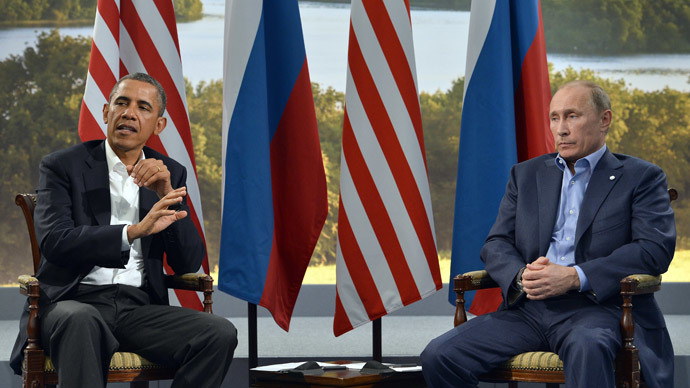Stratfor founder: ‘US fears a resurgent Russia’

Washington “fears” a resurgent Russia, which harps back to the Cold War says George Friedman, the CEO and founder of forecasters Stratfor. He also believes the US started to meddle in Ukraine in retaliation for Russia outfoxing Obama over Syria.
Friedman says the United States has been intervening around the globe for over a century with the goal of making sure it keeps potential rivals in check. For the United States, any rising power in Europe represents a threat, and despite the end of the Cold War, Washington is still “hypersensitive” to the possible reemergence of Russia as a super power.
READ MORE: Russia overestimated EU’s independence from US – Lavrov to French media
“The United States intervened in World War I in 1917 to block German hegemony, and again in World War II. In the Cold War the goal was to prevent Russian hegemony. US strategic policy has been consistent for a century,” he stated in an article on Stratfor’s website.
Startfor is a geopolitical intelligence firm that provides strategic analysis and forecasting to individuals and organizations around the world. It first came to prominence in 1999 with the release of its Kosovo Crisis Center, during NATO airstrikes over Serbia. It has often tried to predict various paths that governments and political leaders may take.
The Ukraine question
Now the US has its sights set on Ukraine. Firstly Washington has a fear of Russia regaining control in the region. Throughout the crisis, America has accused Russia of regional aggression, however, on the contrary, Russians feel they have been far from being on the offensive and have been on the defense.
READ MORE: Russia not attacking west, just defending its interests - Putin
“If Russia manages to reassert its power in Ukraine, then what will come next? Russia has military and political power that could begin to impinge on Europe. Therefore, it is not irrational for the United States, and at least some European countries, to want to assert their power in Ukraine,” Friedman said.
Secondly, Washington’s presence in Ukraine is also seen as a way to punish Russia for “embarrassing”’ Barack Obama over Syria. Friedman believes the US President did not want to invade Syria, even when Assad's forces were accused of having used poison gas.

This would have given Obama the perfect excuse to launch a military attack, but he decided against intervention due to fears that it could have led to the creation of another Sunni jihadist movement in the region. “The Russian attempt to embarrass the president by making it appear that Putin had forced him to back down triggered the U.S. response in Ukraine.”
Friedman is a political scientist, who founded Stratfor in 1996. He accepts that “Ukraine is of fundamental importance to Russia,” and will continue to be alarmed about further Western encroachment.
“As difficult as this is for Westerners to fathom, Russian history is a tale of buffers. Buffer states save Russia from Western invaders. Russia wants an arrangement that leaves Ukraine at least neutral.”
Sanctions not working
Friedman, who was born in Hungary before emigrating with his parents to the US, says Russia has the ability to emerge from US led sanctions and the recent drop in the ruble due to falling oil prices.
“Russians' strength is that they can endure things that would break other nations. It was also pointed out that they tend to support the government regardless of its competence when Russia feels threatened.”
READ MORE: Gorbachev: Russia, US, EU should hold summits to ‘defrost’ relations
Friedman believes that the implementation of sanctions will not have the desired effect the US and EU hope. He points to the fact that President Vladimir Putin is “still enormously popular.” Also he has learned that the Russian mindset is different to that of those in the West, partly because the population has become accustomed to political and economic upheaval over the last century.
“The most important lesson I might have learned in Russia — ‘might’ being the operative term — is that Russians don't respond to economic pressure as Westerners do, and that the idea made famous in a presidential campaign slogan, ‘It's the economy, stupid,’ may not apply the same way in Russia.”
Overall Friedman believes there is a lot of mistrust between Russia and America, with neither side acknowledging the other’s fears.
“All of the good will in the world — and there is precious little of that — cannot solve the problem of two major countries that are compelled to protect their interests and in doing so must make the other feel.”












